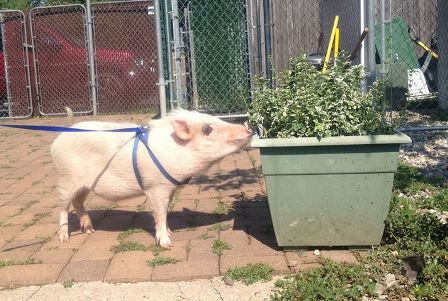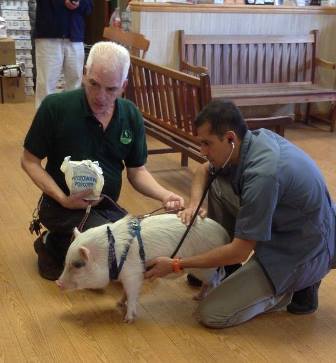Potbellied pigs make great pets for the family or individual who are able to provide the proper care and housing they require. Your pet pig will be a member of your household for up to fifteen years. Therefore, it is wise to do your research first. You also want to make a wise choice when approaching a breeder or sanctuary and know what questions to ask.

Edison the Potbellied Pig enjoying the outdoors at Belle Mead Animal Hospital
We recommend that you look for a pig that is registered, vaccinated, socialized and has been properly cared for. Taking the time to search for a reputable breeder or sanctuary will be well worth the investment in your new pet pig.
Following are a few things you need to know before you bring home a potbellied pig.
Proper housing
Potbellied pigs are highly intelligent and can become bored very easily which might lead to destructive behavior indoors – they can become aggressive if kept inside the home full time.
Even though your pig can be litter box trained, he/she must have access to an outside area at all times to remain happy and non-aggressive. They also do well with the companionship of at least one other pig. Please be sure to supervise small children and other pets around your pig(s).
Your potbellied pig can be crated at night, but they must be kept warm. You can provide a heat lamp or jacket for your pet. Clean straw and fleece blankets are recommended as comfortable bedding.
Feeding guidelines
Commercial pig food that is nutritionally balanced and is recommended. Baby pigs should be fed a starter feed first. At about 2 ½-3 months of age, switch to a maintenance diet that will contain a higher percentage of protein.
Remember, a potbellied pig can bite accidentally. Stay safe and do not try to feed your pig by hand. It’s best to place your pig’s food on the ground or in a bowl, and remember to provide access to fresh water at all times.
It’s recommended you feed your pig 1/4-1/2 cup of food twice daily. Just like other types of pets and humans, pig obesity can lead to future health problems. Please monitor your pig’s food intake, and limit fruits and vegetables that will cause your pet to gain unnecessary weight.
Potbellied pigs gain weight quickly, and a healthy pig will be half of his adult weight in only one year’s time.
You can motivate your pig with food treats as rewards. Your pet will soon associate people and positive attention with food and look forward to interacting with you.
Veterinary care
Potbellied pigs can be hardy pets, but they do require regular veterinary care to stay healthy. Pigs should receive annual vaccinations, hoof trimmings, and physical exams.

Edison the Potbellied Pig visiting with Dr. Martins, DVM for an exam at Belle Mead Animal Hospital
Spaying / neutering at the proper age is essential to ensure a sweet natured pig. Discuss this with your veterinarian along with a proper vaccination schedule. There are several vaccinations highly recommended for outdoor pigs which include:
- Rabies vaccination
- Erysipelas (caused by a bacterium found in the ground)
- Tetanus, Bordatella, and Pasturella vaccinations
Worming twice a year in the spring and fall is another essential for your potbellied pig. Discuss worming your pig with your veterinarian the learn the proper worming procedure.
Owning a potbellied pig can be a fun and rewarding experience. Please feel free to contact our office if you have further questions or would like to schedule an appointment for your own pig’s care.
Dr. Joe Martins, DVM, Belle Mead Animal Hospital

Dr. Joe Martins, DVM, Belle Mead Animal Hospital


